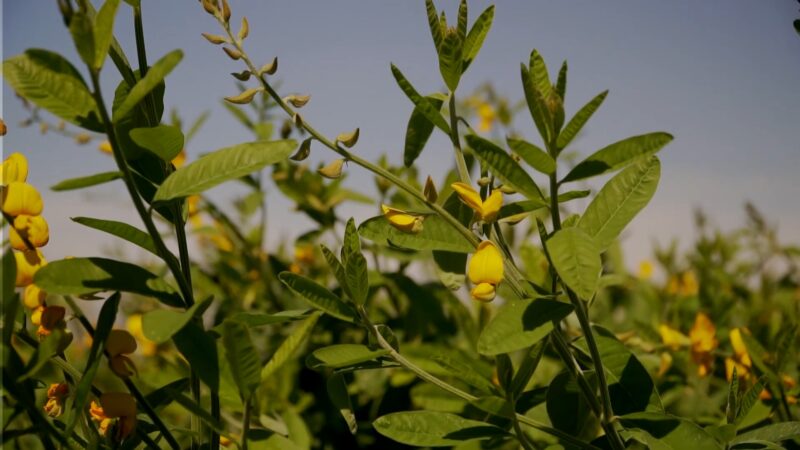The world of agriculture has seen an ever-evolving array of crop varieties, each with its unique characteristics and benefits. One such standout, with its remarkable potential in soil improvement, weed suppression, and animal fodder, is sunn hemp (Crotalaria juncea). In this comprehensive exploration, we’ll get into what this plant is and how it’s used in agronomy.
Also check out my story on growing food in a sustainable way.
A Gift from Nature
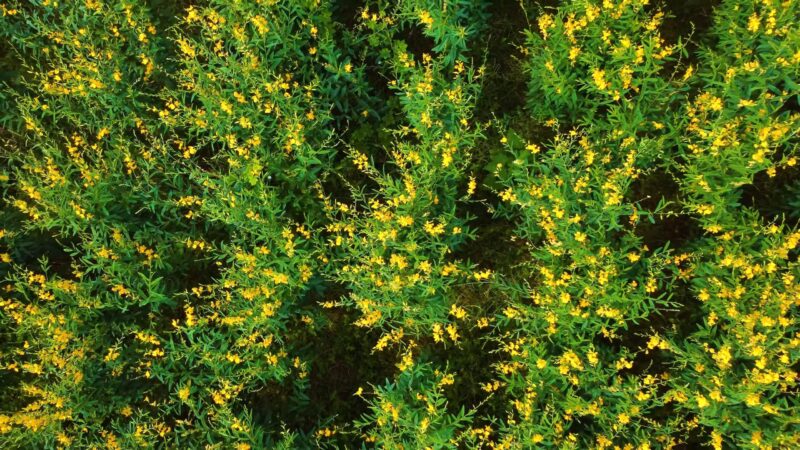
Native to South Asia, it has spread across tropical and sub-tropical areas globally. Beyond its practical uses in farming, this species benefits the environment and enriches the soil.
Sunn hemp cuts an impressive figure in the field. Its slender green stalks shoot upwards, seeking the sun, often reaching 10 feet tall. Delicate leaves composed of leaflets lend it an exotic charm.
And throughout summer, the plant explodes in color, decorating itself with swaths of bright yellow blossoms. Later come small cylindrical pods containing seeds, bearing its fruit.
One of the most remarkable things about this plant is its ability to nourish the earth. Being a legume allows it to form special bonds with bacteria, working together to pull nitrogen from the air and feed the soil. This natural process enriches the land, making fertilizer for crops from what wafts overhead.
But its gifts do not end there. A vast network of roots dig deep, bettering the texture of the dirt. They also stop valuable topsoil from washing away with storms. Along with this, the sunn hemp’s lively growth chokes out unwanted weeds without harsh sprays.
Sunn Hemp in Agriculture
Sunn hemp isn’t just an agricultural novelty but a valuable cash crop with numerous applications.
In many parts of the world, it’s grown for its fiber, which has various industrial uses, such as making ropes, twine, and even paper.
1. Renewing the Land
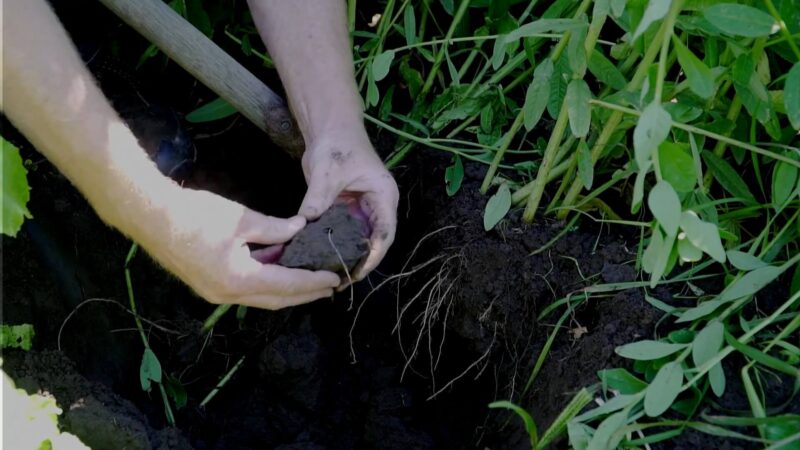
Farmers prize sunn hemp for its ability to rejuvenate soil. Planted between harvests or on empty fields, it plays a vital role in nurturing the earth. Allow me to explain:
- Nourishing the Next Crop: As we know, it draws nitrogen from above. When folded back into the ground before fully growing, its nutrients feed what will follow.
- Weeds Struggle to Compete: It spreads and thickens quickly, crowding out pests seeking space to develop. Forming a dense protective layer, few invaders find room to settle.
- Holding What Feeds Us: Its deep roots take hold against the pull of moving water, anchoring tightly that which we rely on. This proves invaluable on sloping lands where soil might otherwise slip away.
2. Livestock Forage
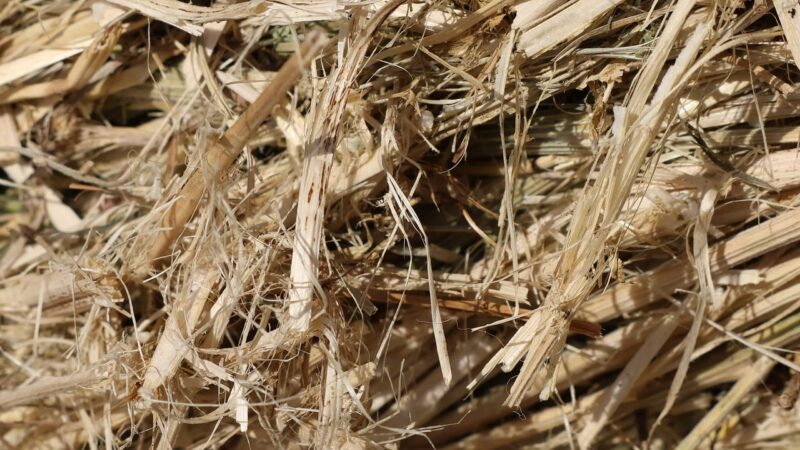
Its lush greenery serves as highly nutritious fare for the animals guiding farms with their strength and care.
- Rich Nourishment: Sunn hemp provides protein in abundance, a perfect extra in meals. This helps our helpers stay hale and hearty, with livelier dispositions and outputs rewarding their keepers in turn.
- Replenishing What’s Taken: Through rotating where it’s grown, farmers cycle back what’s drawn from the fields. Absorbing nutrients spread wide, it returns them to the earth in a gift of renewal when eaten or tilled under once more.
3. Crop Rotation
When planting in scheduled shifts, sunn hemp plays diverse roles attending life’s continuum:
- Preparing Bountiful Feasts: Crops depending on plentiful nitrogen find the land readied through its gift of renewal. The richness imparted ensures subsequent stalks and stems may flourish.
- Foiling Troubles Repetition: By varying what follows where, it helps disrupt recurrent pests seeking the familiar, lessening need for manufactured reliefs.
- Cultivating Continuous Fertility: With its inclusion over the seasons, it contributes to lasting land health. Nurturing soil with organic gifts, nutrient reserves, and better structure is all nourished in turn.
4. Sustainable Agriculture
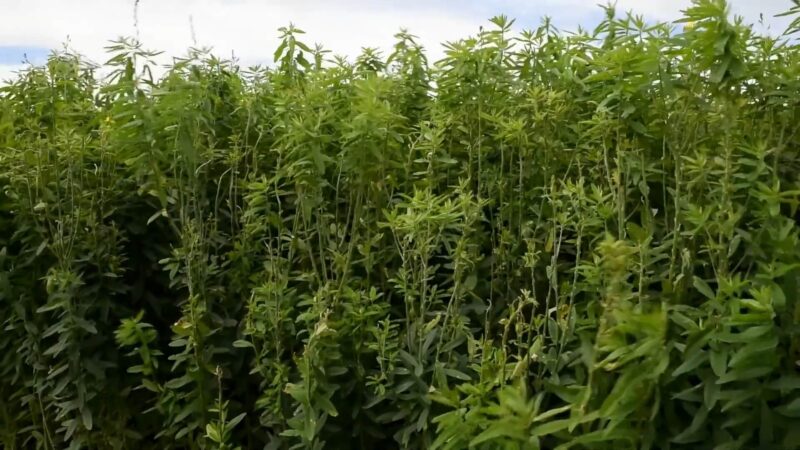
- Decreases need for pesticides: Through smothering invaders and enriching bare soils, reliance on manufactured poisons decreases, in respect of all dwellers.
- Nurturing the Whole: Its presence helps weave a range of inhabitants, among ground creatures aiding and insects carrying pollen far.
- Holding Future Fertility: Deep roots grasping sediments protect the deposit of life upon which all depend, sustainably shielding each generation’s providers.
Frequently Asked Questions
1. Is sunn hemp suitable for all climates?
Sunn hemp thrives in warm, tropical, and subtropical climates. It may not perform well in cooler regions.
2. Can sunn hemp be grown as a cash crop worldwide?
While it’s cultivated for fiber in some regions, its primary use as a cash crop is location-dependent.
3. Does sunn hemp have any known pests or diseases?
Sunn hemp is relatively pest and disease-resistant but can be vulnerable to certain nematodes and aphids.
4. Is sunn hemp safe for livestock to consume?
Yes, sunn hemp is safe for livestock when fed in moderation, but excessive consumption can lead to toxicity.
5. How long does it take for sunn hemp to improve soil fertility?
Soil improvement can be seen within weeks to months after incorporating sunn hemp into the soil.
6. Can sunn hemp be used for phytoremediation?
Yes, sunn hemp is known for its ability to absorb heavy metals, making it useful for phytoremediation efforts.
7. Are there any special considerations for sunn hemp cultivation?
Ensure proper inoculation with rhizobia bacteria for optimal nitrogen fixation, and monitor for seed production to prevent unwanted spread.
8. Can sunn hemp be grown in home gardens?
Yes, sunn hemp can be grown in gardens, provided the climate is suitable, and proper care is taken.
9. Does sunn hemp have any allelopathic effects on other crops?
Sunn hemp may release allelopathic compounds that inhibit the growth of certain crops, so it’s essential to plan rotations accordingly.
Final Words
Sunn hemp has many benefits to offer farmers and the environment. Its soil-enriching abilities, weed suppression, and use as livestock feed make it a valuable crop. Whether growing it yourself or learning more about sustainable practices, sunn hemp deserves consideration.

